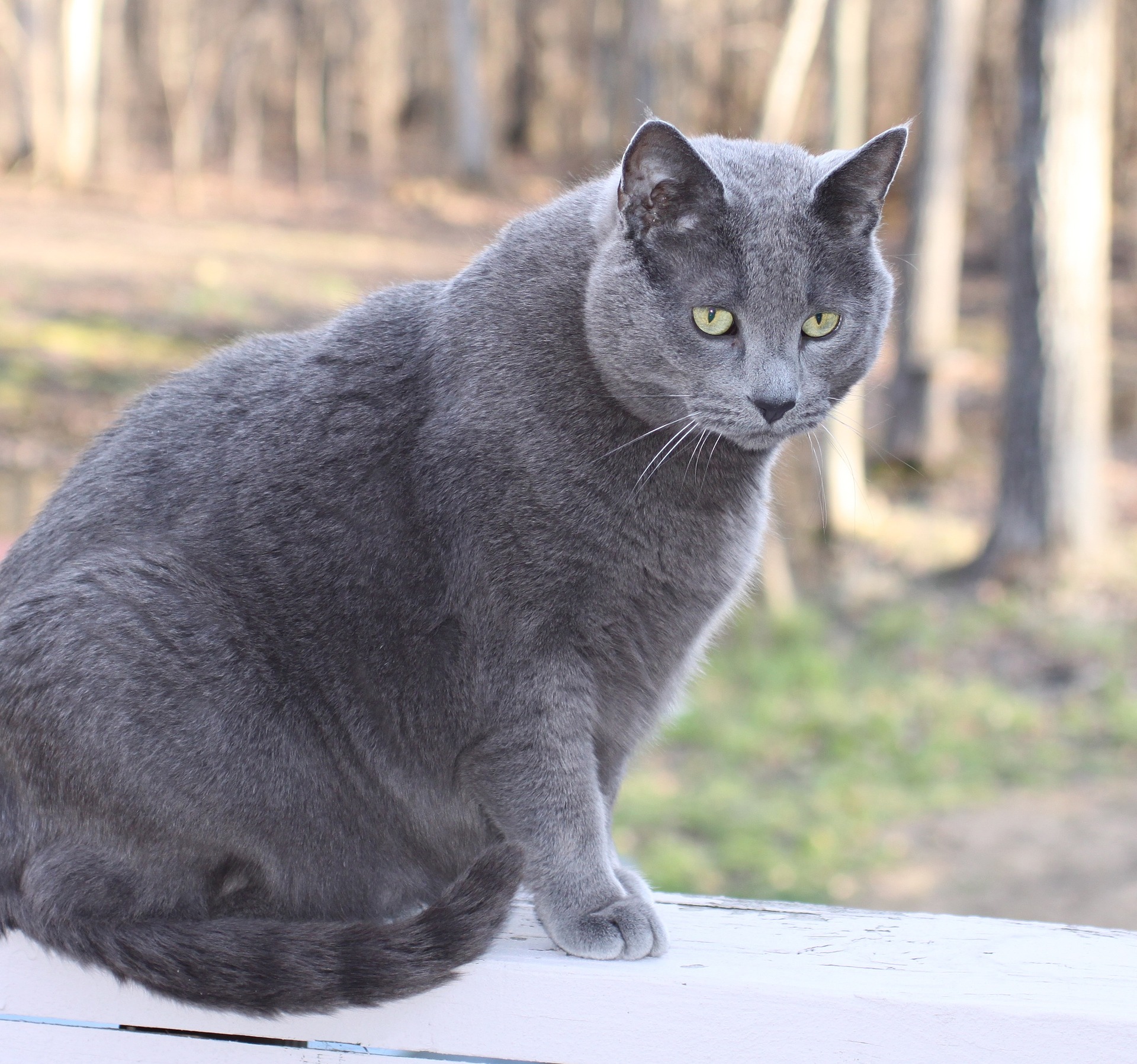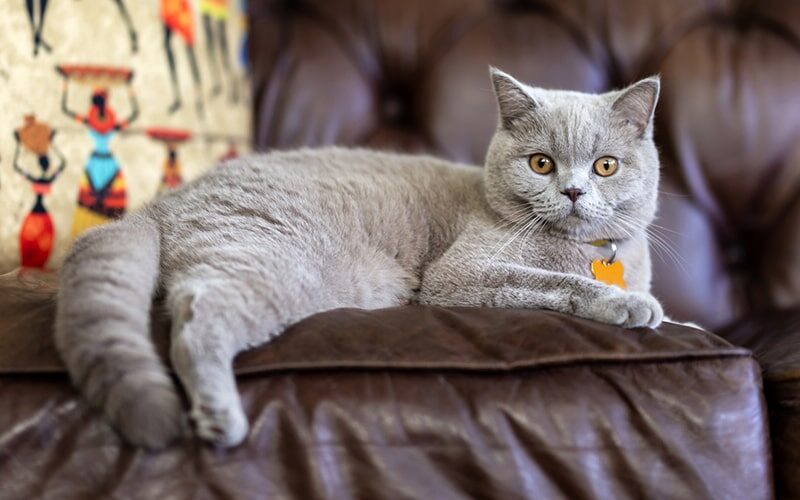The British Shorthair breed is prone to obesity if not properly managed. The British Shorthair breed is known for its charming round face and plush coat.
However, these adorable felines are prone to obesity if not properly managed. Obesity in British Shorthairs can lead to a range of health issues, including heart disease, diabetes, and joint problems. Therefore, it is crucial for owners to take proactive steps to maintain a healthy weight for their cats.
This can involve monitoring portion sizes, providing regular exercise opportunities, and consulting with a veterinarian for dietary recommendations. By promoting a balanced and active lifestyle, owners can help their British Shorthairs live long and healthy lives.
Understanding The Risks And Consequences
Understanding the risks and consequences of owning an obese British Shorthair is crucial for pet owners. Being overweight can lead to various health problems such as heart disease and joint issues, affecting the cat’s overall quality of life. It is important to monitor their diet and provide regular exercise to help maintain a healthy weight.
The Health Risks Associated With Obesity In British Shorthair Cats
Just like humans, cats can also become overweight or even obese. Obesity in British Shorthair cats can lead to a range of health problems that can affect their overall well-being and quality of life. Understanding the risks and consequences of obesity is crucial to ensure a healthy and happy kitty.
Let’s dive into the specific health risks associated with obesity in British Shorthair cats:
- Diabetes: Obesity increases the risk of developing diabetes in cats. Insulin resistance or impaired glucose metabolism can occur, leading to high blood sugar levels and the need for lifelong treatment.
- Joint Problems: Extra weight puts excessive strain on a cat’s joints, leading to arthritis or other joint-related issues. Mobility can become a challenge, causing discomfort and reducing the cat’s ability to jump and play.
- Heart Disease: Obesity in British Shorthair cats is linked to an increased risk of heart disease. Fat accumulation can lead to high blood pressure and heart abnormalities, which can be life-threatening if left untreated.
- Respiratory Issues: Carrying excess weight can make breathing difficult for cats. Obese British Shorthair cats may experience panting, shortness of breath, or even respiratory distress, especially during physical activity.
- Digestive Disorders: Obesity can negatively impact a cat’s digestive system. Cats may suffer from constipation, gallbladder disease, or liver problems due to fat accumulation in the abdomen.
Identifying Signs Of Obesity In Your Kitty
It’s essential to identify the signs of obesity in your British Shorthair cat. Obesity might not always be apparent, as the breed tends to have a stockier build. Watch out for the following signs that indicate your kitty may be carrying some extra pounds:
- Difficulty Feeling Ribs: When you gently run your hands along your cat’s sides, it should be easy to feel their ribs. If you have trouble finding or feeling the ribs, there’s a high chance your cat is overweight.
- Excessive Fat Deposits: Check for fatty deposits around the base of the tail, neck, and abdomen. If these areas feel flabby or show bulges, it could be a sign of obesity.
- Round and Distended Appearance: Instead of having a defined waistline, overweight British Shorthair cats tend to appear more rounded and have a distended abdomen.
- Reduced Activity: Obese cats may become less active and spend more time sleeping than engaging in play or exercise. They may also show less interest in toys or activities they previously enjoyed.
- Difficulty Grooming: Cats with obesity may find it challenging to groom themselves properly, resulting in a coat that appears dull, matted, or unkempt.
By recognizing these signs of obesity, you can take early action to help your British Shorthair cat achieve a healthier weight and prevent potential health complications. Regular exercise, portion control, and a balanced diet are key in managing or preventing obesity in cats.
Remember, a healthy cat is a happy cat, so stay proactive and keep an eye on your kitty’s weight and well-being to ensure they live their best life!
Developing A Weight Loss Plan For Your British Shorthair
Is your British Shorthair cat struggling with obesity? Develop an effective weight loss plan to help them shed those extra pounds and improve their overall health. Proper diet, portion control, and regular exercise are crucial in managing weight in your cat.
Consulting With A Veterinarian For Guidance And Support
- Arrange a consultation with a veterinarian to ensure proper guidance and support for your obese British Shorthair.
- Seek professional advice on creating a personalized weight loss plan for your furry friend.
- Discuss your cat’s current health condition, including any underlying medical issues that may affect their weight loss journey.
- Ask the veterinarian to determine the ideal weight for your British Shorthair and establish a realistic target.
- Schedule regular check-ups to monitor your cat’s progress and make any necessary adjustments to the weight loss plan.
Establishing A Healthy Diet And Nutrition Plan
- Feed your British Shorthair a balanced diet that is appropriate for their weight loss goals.
- Measure their food portions accurately to prevent overfeeding.
- Switch to a high-quality, low-calorie cat food that promotes weight management.
- Include more lean proteins in the diet to help your cat feel full and maintain muscle mass.
- Limit the intake of treats and avoid table scraps to avoid unnecessary calorie intake.
Implementing A Regular Exercise Routine
- Create a consistent exercise routine to help your British Shorthair shed those extra pounds.
- Engage in interactive play sessions using toys that encourage physical activity.
- Provide climbing opportunities such as cat trees and scratching posts to promote exercise.
- Set aside dedicated playtime each day for your cat to engage in active pursuits.
- Gradually increase the intensity and duration of exercise to help your cat build endurance and burn calories.
Remember, it’s crucial to consult with a veterinarian before making any significant changes to your cat’s diet or exercise routine. With their guidance and support, you can create a tailored weight loss plan that suits your British Shorthair’s specific needs.
Understanding The Unique Needs Of British Shorthair Cats
Understanding the unique needs of obese British Shorthair cats is crucial for their overall well-being. These cats require special attention to their diet and exercise routines to prevent health issues associated with obesity. Providing a balanced diet and engaging them in regular physical activities can help them maintain a healthy weight.
British Shorthair cats have their own set of unique needs, especially when it comes to weight management. As a cat parent, it’s essential to understand the factors specific to this breed that can contribute to obesity and how to address them effectively.
By considering these breed-specific factors and implementing a suitable weight loss plan, you can ensure the health and well-being of your British Shorthair cat. Let’s delve into the key aspects to keep in mind.
Considering Breed-Specific Factors For Weight Loss
When it comes to helping your obese British Shorthair cat shed those extra pounds, it’s crucial to take into account certain breed-specific factors. Here’s what you need to know:
- Slow Metabolism: British Shorthairs often have a slower metabolism than other breeds, which makes weight loss a bit more challenging. This means they require a carefully managed and controlled diet to ensure gradual and sustained progress.
- Prone to Overeating: Known for their love of food, British Shorthairs can be prone to overeating, leading to weight gain. Their strong appetite and tendency to seek out treats and snacks require special attention to portion control.
Managing Portion Control And Treats
To help your British Shorthair cat lose weight in a healthy manner, you need to manage their portion sizes and treats appropriately. Here’s how:
- Consult a Veterinarian: Seek advice from a veterinarian to determine the optimal daily calorie intake for your British Shorthair based on their current weight, age, and activity level. This will provide a clear guideline for portion control.
- Measured Meals: Use a designated measuring cup to ensure you’re providing the right amount of food during mealtime. Split their daily calorie intake into smaller, frequent meals throughout the day to satisfy their appetite and prevent overeating.
- Limited Treats: While it’s tempting to spoil your British Shorthair with treats, it’s important to limit their intake. Opt for low-calorie treats or consider substituting them with interactive playtime or affection as rewards.
Monitoring Progress And Making Adjustments To The Plan
Monitoring your British Shorthair’s weight loss progress is crucial to ensure you’re on the right track. Here’s what you should do:
- Regular Weigh-ins: Weigh your cat regularly, preferably once a week, to track their progress. Make a record of the weight loss and consult with your vet if there are any concerns or if adjustments to the plan are needed.
- Adjustments in Calorie Intake: As your British Shorthair starts losing weight, it’s important to reassess their calorie intake. Gradually adjust the portion sizes and consult with your veterinarian to make sure you’re still meeting their nutritional needs.
- Regular Exercise: Encourage your British Shorthair to engage in regular play and exercise sessions. This helps burn calories, build muscle tone, and provide mental stimulation, all of which contribute to their overall weight loss journey.
By understanding the unique needs of British Shorthair cats and tailoring a weight loss plan to address those needs, you can support your obese cat in achieving a healthier lifestyle. With proper portion control, limited treats, and regular monitoring, you can help your British Shorthair not only shed excess weight but also improve their overall well-being.

Credit: vetnutrition.tufts.edu
Frequently Asked Questions For Obese British Shorthair
Are British Shorthairs Prone To Obesity?
Yes, British Shorthairs are prone to obesity due to their slow metabolism and tendency to overeat.
Are British Shorthairs Naturally Chubby?
British Shorthairs can naturally have a chubby build due to their dense bone structure and tendency to gain weight.
How Big Can A British Shorthair Get?
A British Shorthair can grow to be a medium to large-sized cat, reaching weights of 9 to 18 pounds.
What Is The Ideal Weight For A British Shorthair?
The ideal weight for a British Shorthair depends on factors such as gender and genetics.
Conclusion
To sum up, addressing obesity in British Shorthair cats is of utmost importance for their overall health and well-being. As responsible pet owners, we need to be vigilant about their dietary habits and ensure they are receiving balanced, portion-controlled meals.
Encouraging regular exercise and playtime is equally vital in preventing weight gain and promoting an active lifestyle. Regular veterinary check-ups can help us catch any weight-related issues in the early stages, enabling prompt intervention and management. Moreover, by providing a stimulating environment and engaging our feline friends in interactive toys and activities, we can keep them mentally stimulated and content.
Remember, a healthy weight is the key to a prolonged and happy life for our beloved British Shorthair companions. Let’s prioritize their weight management and take the necessary steps to safeguard their health and well-being.


